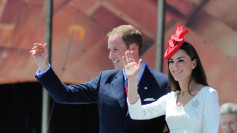US federal prosecutors asked a judge on Monday to sentence US President Donald Trump's confidant Roger Stone to serve seven to nine years behind bars after his conviction on obstruction charges and witness tampering.
Stone is set to face sentencing by US District Court Judge Amy Berman Jackson on February 20, after a jury in November determined the self-proclaimed "dirty trickster" guilty on seven counts of lying to Congress, witness tampering, and obstructing the House's probe into whether Trump's campaign collaborated with Russia to alter the 2016 election.
In a sentencing report released Monday evening, prosecutors requested for Stone to serve in federal prison between 87 and 108 months, in compliance with the government's sentencing guidelines.
Such a sentence would send out a message to discourage others who might think about lying or obstructing a congressional investigation or witness tampering.
In the report, they accused that Stone decided to "double and triple" his criminal behavior by tampering with a witness for months to be able to make sure his obstruction would be effective.
During the proceedings, prosecutors presented their case that Stone was lying to senators about his outreach to WikiLeaks - the website that exposed several leaked Democratic emails ahead of the 2016 US polls that proved humiliating to Trump's Democratic rival, Hillary Clinton - to shield Trump from looking bad.
Stone's dramatic trial included references to the movie "The Godfather Part II," an interpretation of Senator Bernie Sanders by court witness Randy Credico, and testimony of political figures like former Trump campaign director Steve Bannon and ex-Trump campaign vice president Rick Gates.
Some witnesses said they assumed that Stone had inside knowledge about when WikiLeaks would divulge more damaging emails regarding Clinton. He did not have such knowledge, in fact.
Stone has denied wrongdoing and has strongly dismissed the prosecution as politically motivated against him. During his trial he did not take the stand and his attorneys did not call any witnesses to his defense.
The evidence that was shown in court did not tackle Mueller's finding specifically that there was insufficient proof to prove a criminal conspiracy between Trump's campaign and Russia to tip the US president's favor for the result of the 2016 presidential election.
But it gave new details into the scramble within the Trump campaign when in July 2016 it was announced that the anti-secrecy platform WikiLeaks had more than 19,000 emails stolen from the Democratic National Committee servers.






